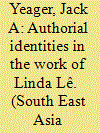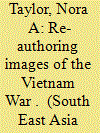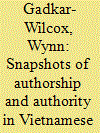|
|
|
Sort Order |
|
|
|
Items / Page
|
|
|
|
|
|
|
| Srl | Item |
| 1 |
ID:
153536


|
|
|
|
|
| Summary/Abstract |
Issues of authenticity, originality, and plagiarism have haunted Francophone literatures from the time Camara Laye was first accused of having copied the work of others. Official positions on plagiarism and copyright have provided a framework to judge the originality of literary and scholarly work, but even these pronouncements leave much open to interpretation, which may, in fact, mask the real motivations for accusations of plagiarism. Francophone writers with links to Vietnam would also be under scrutiny in such a context. Linda Lê, the most prolific writer “from Vietnam” who writes in French, cleverly and playfully treats the questions of literary authenticity, creativity, originality, intertextuality, and authorship in a strong metatextual thread running in some form throughout her long bibliography. In this way, she also examines the position of the immigrant writer in exile, the negotiation of multiple heritages and languages, and what is necessarily the shifting literary scene in France and elsewhere, as immigrant writers, among others, redefine “French literature.”
|
|
|
|
|
|
|
|
|
|
|
|
|
|
|
|
| 2 |
ID:
153533


|
|
|
|
|
| Summary/Abstract |
In Vietnamese medicine, gia truyền (“family recipes”) refers to a set of texts, primarily in chữ nôm (demotic Vietnamese characters), that preserves local knowledge about how practitioners in a specific family-based medical circle could use various plants and other materia medica to cure disease. This article traces the history of the transmission of gia truyền in the 19th and 20th centuries. It suggests that prior to the 1920s, gia truyền were written anonymously to protect the author’s identity in the face of the Nguyễn dynasty’s repression of chữ nôm writing. In the 1920s, precisely at the time that hán-nôm writing was being eclipsed by education in French and quốc ngữ (Romanized Vietnamese), Vietnamese medical practitioners experienced a renaissance in the writing of chữ nôm gia truyền. Moreover, chữ nôm writing in the gia truyền genre continued until at least the 1990s.
|
|
|
|
|
|
|
|
|
|
|
|
|
|
|
|
| 3 |
ID:
153535


|
|
|
|
|
| Summary/Abstract |
Vietnamese scholar Ngô Tự Lập recently attempted to establish Hồ Chí Minh as the birthfather of futurist fiction in Vietnam by reading a 1949 story called “The Ten-year Sleep” by Trần Lực, later said to be Hồ Chí Minh. To give credibility to his claim, Ngô cites Brent Hayes Edwards’ praise for the futuristic power of an earlier story signed Nguyễn Ái Quốc, whom Edwards unproblematically narrates as the future Hồ Chí Minh. I read the “Ten-year Sleep” and a biography said to be written by Hồ Chí Minh himself to argue that the story stages the founding of the nation through the omnipresence of the figure of Hồ Chí Minh within that story, enabling a nationalist prophetic temporality that erases the heterogeneity of time in the same way that the name Hồ Chí Minh erases the heterogeneity of the various authors of the texts attributed to him. The article considers the politics of such a move in order to recover the rich potentials at the intersection of black and Vietnamese studies.
|
|
|
|
|
|
|
|
|
|
|
|
|
|
|
|
| 4 |
ID:
153531


|
|
|
|
|
| Summary/Abstract |
This introduction provides a brief overview of the articles in this volume. It highlights the development of a politics of authorship and authority in Vietnam and different roles of authors in different genres of text, and suggests ways of moving beyond a framing of authorship that endorses East/West and structuralist/contextualist dichotomies.
|
|
|
|
|
|
|
|
|
|
|
|
|
|
|
|
| 5 |
ID:
153534


|
|
|
|
|
| Summary/Abstract |
This article looks at a work by the Vietnamese-American artist Dinh Q Lê (b. 1968) that was installed at one of the world’s most important contemporary art events, the quinquennial exhibition dOCUMENTA (13) in Kassel, Germany in 2012. The work consisted of a series of drawings made by artists from North Vietnam who followed the guerrilla movement along the Ho Chi Minh trail, along with a film consisting of interviews with surviving artists and animations of the drawings. The work raises questions not only about authorship—as the featured artist is not the maker of the drawings—but about the role that art plays in writing and re-writing art history.
|
|
|
|
|
|
|
|
|
|
|
|
|
|
|
|
| 6 |
ID:
153532


|
|
|
|
|
| Summary/Abstract |
Until recently, the dominant interpretation of the concept of authorship in East and South East Asia held that in these regions there was no author—in the Western sense of the term—because authorship was communal and was determined by a layering of interpretations of classic texts through the process of commentary. This has allowed commentary on authorship in Asia to largely sidestep substantive critiques of the politics of authorship offered by Michel Foucault and Roland Barthes. While not refuting this interpretation, this article claims that the issue of authorship is considerably more complicated than this dominant interpretation might imply. In Vietnamese annals such as the Đại Việt Sữ Ký Toàn Thữ, commentators such as the literatus Ngô Sĩ Liên tried to assert their authorship by supplanting or refuting previous authors. In addition, the question of authorship in pre-modern Vietnam is often confused by the lack of a clear delineation between different languages and texts, which is why one can often find pre-modern texts interspersed with chữ Hán (classical Chinese), chữ Nôm (classical Vietnamese), quốc ngữ, and even Lao or Muong. These strategies of authorship changed in the late 19th and early 20th centuries. Drawing on the work of Naoki Sakai, Keith W Taylor, and OW Wolters and on materials from the annals, civil service examinations, and modern writings, this article argues that the concepts of authorship, individual subjectivity in language, and language differentiation all coincided with the rise of nationalism at the turn of the 20th century. Authorship and nationalism are then tied to the concept of the separation and translation of languages and cultures, which are in turn related to the need to configure a particularistic Vietnamese identity vis-a-vis a perceived “West.”
|
|
|
|
|
|
|
|
|
|
|
|
|
|
|
|
|
|
|
|
|